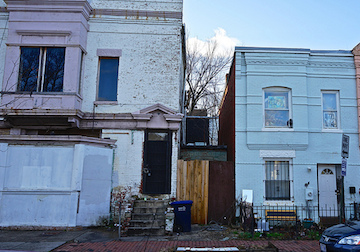Washington, D.C., Trash Is Not Minorities’ Treasure
While garbage from newly gentrified neighborhoods in the nation’s capital gets removed, disenfranchised communities suffer the consequences of hazardous waste management. A neighborhood in Washington, D.C. (via Flickr)
A neighborhood in Washington, D.C. (via Flickr)
A neighborhood in Washington, D.C. (via Flickr)
“Don’t be afraid to call it environmental racism.”
Robin Lewis, an environmental activist and urban planning consultant, doesn’t mince words: Washington, D.C., has a major trash problem.
The United States capital’s refusal to clean up its own mess has produced a festering heap of environmental injustice for communities of color. While garbage from newly gentrified neighborhoods in Washington, D.C., gets removed, disenfranchised communities—such as Ward 5 in the eastern sector of the city—suffer the consequences of hazardous waste management.
Ward 5 remains one of the few nongentrified sectors in Washington, D.C. It also is where trash is transferred before making its final stop in the racially diverse city of Lorton, VA. The communities surrounding Ward 5 have called for the removal of these private transfer stations for three decades without success. As a result, the community must endure terrible odors, vermin, exhaust from transfer trucks and even airborne mercury that rises from the sites.
After the trash leaves the transfer sites for Lorton, it is incinerated. This process is part of the city’s goal of “zero waste to landfill,” but trash incineration adds pollution to the environment.
“Burn it [trash] and pretend that the toxic ash doesn’t go to a landfill,” says Mike Ewall, founder and director of the Energy Justice Network.
An issue that is not addressed by proponents of zero waste to landfill, incinerators do not prevent the need for landfills. Instead, they leave behind smaller, more toxic, landfills.
“For every 100 tons of trash burned, 30 tons of ash remain,” Ewall explains. “The rest went into the air.”
Trash incineration increases the toxicity of waste management. Burning trash creates airborne toxins, including mercury, dioxins and furans, all of which are harmful to humans.
The Lorton trash-burning facility, also known as Covanta incinerator, is the second-largest source of nitrogen oxide air pollution, behind Dulles Airport, within a 20-mile radius of D.C. The incinerator produces asthma attack-inducing nitrogen oxides that may be linked to the already-elevated asthma rates in Washington, D.C.
Ewall is focused on ending environmental injustices for Lorton residents and the neighborhoods surrounding the 5th Ward, but he wants all Washington, D.C., residents to be aware of—and help fix—the “Injustice in which they participate every day.” Ewall’s solution to the complex issue is simple: “Stop burning.”
Across state lines, Maryland citizens fight their own discriminatory policies.
Prince George’s County, one of the most affluent African-American counties in the U.S., now copes with absorbing African-Americans forced from gentrified areas in Washington, D.C.
The displaced population is growing, and the county faces the prospect of becoming the next trash incineration site—an outcome many citizens desperately want to avoid. Citizens in Prince George’s County are exploring how to handle their trash.
The county has pared down to a list of seven possible trash contractors. Two of these contractors use trash incineration, a process unapproved by Maryland’s, Baltimore City, and fought by Lorton. According to Lewis, the residents of Prince George’s County are unable to have public hearings or public input into the decision making process until the county selects one of the seven trash contractors from its list.
“Injustice is when you impose on the community without their buy-in and without their input,” she says.
Lewis says trash incineration can lead to cancers, asthma and toxic soil.
“We want to be at the table. … We want to talk to these vendors, we want to assess the technology that they are proposing, we want them to answer our questions,” she stresses.
Both she and Ewall understand the struggle.
“It doesn’t matter what color you are,” says Lewis. “If you push for discriminatory policies, you are furthering that injustice.”
Ending environmental racism in Washington, D.C., won’t be easy.
The key, Ewall advises, is to understand the environmental justice issues and “reach out for help.”
Your support matters…Independent journalism is under threat and overshadowed by heavily funded mainstream media.
You can help level the playing field. Become a member.
Your tax-deductible contribution keeps us digging beneath the headlines to give you thought-provoking, investigative reporting and analysis that unearths what's really happening- without compromise.
Give today to support our courageous, independent journalists.






You need to be a supporter to comment.
There are currently no responses to this article.
Be the first to respond.